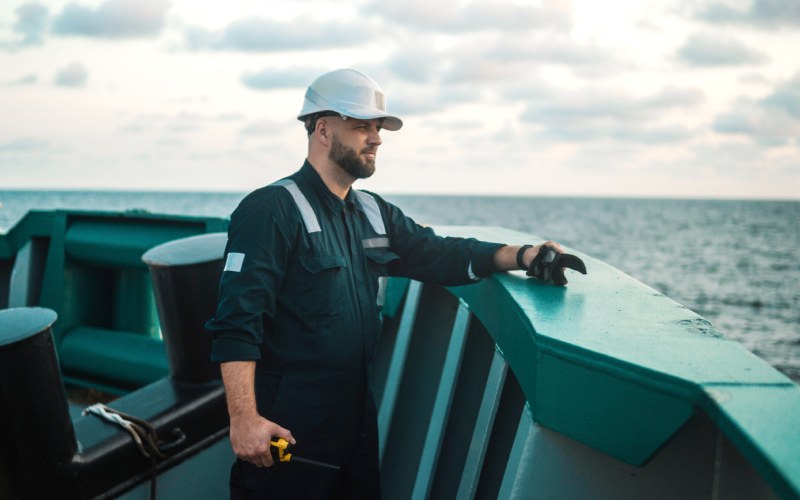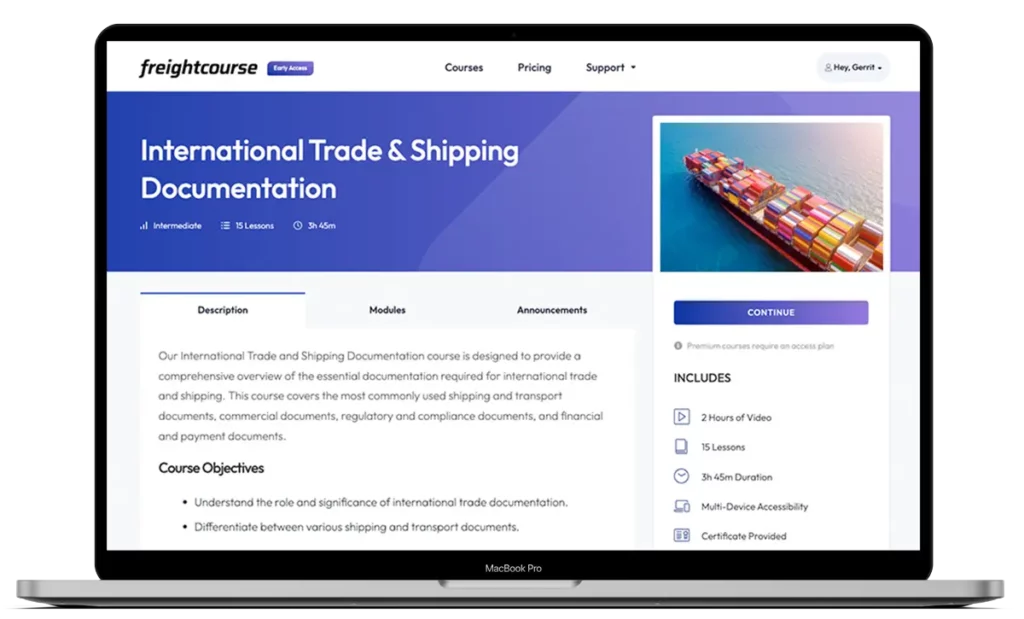The shipping industry accounts for about 90% of all trade and there are more than 50,000 commercial vessels that transport cargo across our vast oceans today. One of the most common merchant vessels are container ships that make up about 10% or just above 5,000 vessels.
Operating a container ship can be quite a feat. It requires a dedicated crew that is highly productive and that has undergone years of training and coordinated efforts, in order to carry out each task effectively.
Depending on the size of the container vessel the crew is typically composed of at least 20 members, from the captain of the vessel to the engineer in the engine room. Getting a job on a container vessel may not be easy for some, especially for those who don’t know where to start! Here are the topics that this guide will cover:
- Type of Jobs on Container Ships
- How to Find Container Ship Jobs
- Salary & Employment Terms of Container Ship Jobs
- General Tips for Getting Container Ship Jobs
This guide aims to acquaint interested seafarers with the type of jobs available on container ships, how to find them, what salaries and employment terms to expect and some general tips to consider when applying.
1. Type of Jobs on Container Ships
As vessel size and capacity have grown consistently over the years, so has the amount of crew required on a container ship. There are many different types of roles for these types of vessels and each crew member has a specific task.

Below is a complete list of container ship jobs that you may come across:
- Ship Captain – A ship captain is also called the Master. The captain of a container ship is ultimately responsible for all aspects, from seaworthiness of the vessel to navigation and the well-being of its crew. The ship captain is first in command and has the final word.
- Chief Officer – Second in command and is responsible for deck operations and ensures that all procedures are thoroughly followed. Also ensures the overall well-being of the crew and equipment. The Chief Officer commonly has watch duties to ensure safety at all times onboard the vessel.
- Second Officer – Considered to be the ship’s navigator and ensures that all equipment needed for navigation is working correctly. He or she is also responsible for updating charts and ship passage plans. The Second Officer also assumes watch duty.
- Seaman (Able/Ordinary) – An able or ordinary seaman is responsible for general vessel upkeep such as painting, cleaning, fixing and garbage disposal. A seaman is also responsible for ensuring that containers are stowed properly on deck. Assignments include minor equipment repairs and maintenance if required.
- Chief Engineer – Responsible for all equipment on board and for all duties fulfilled by other engineers in their department. Ensures that the vessel is functioning as intended and plans scheduled maintenance of parts and components.
- Engineer (First/Second) – The First and Second Engineer are responsible for the engine room, by ensuring that the engines are operating optimally. They also perform regular maintenance of engine room equipment.
- Electrician –The Electrician is responsible for all electrical equipment on the vessel. The electrician must ensure that all equipment is functioning and perform maintenance tasks if necessary. Reporting duties are to the Chief Engineer.
- Superintendent (Vessel/Technical/Cargo) – Oversees and ensures that all repairs at sea and on-dock are followed and executed adequately. Also assess if certain types of equipment require repairs.
- Oiler – In charge of lubrication for several components of the vessel. These typically include the engine, water pumps, gears, and other heavy equipment.
- Fitter – Responsible for the maintenance of damaged parts. This job may require working at heights and also includes welding and riveting.
- Cook – The Cook takes care of the meals on board the vessel and is also responsible for ordering and keeping inventory of all food items.
As you can see, there are a wide range of jobs on a container ship that each require different skill sets. These jobs typically require mechanical, technical, electrical, navigation or even cooking skills.
2. How to Find Container Ship Jobs
There are many ways to find jobs on a container ship. Each of these roles has a specific function, so if you’re interested in a particular role, it’s best to acquaint yourself with the respective requirements.
Officers typically need to have a bachelor’s degree, technical knowledge, and managerial skills as their main responsibility is the seaworthiness of the vessel and ensuring safe operations at all times.
For non-officer positions, applicants typically don’t require a bachelor’s degree but in return require more technical knowledge, depending on the area of responsibility and the scope of work.
It’s important to take note that in certain countries government regulations stipulate employment quotas for nationalities, particularly for officer positions. Therefore, it’s important to understand these quotas beforehand, when applying for a job on a container ship.
Based on current recruitment practices and depending on where you are located, it’s best to get in touch directly with the carrier, recruiters and agencies, open positions on job boards, as well as professional networking websites. Below are some of the best places to find vacant jobs on container ships.
1. Carrier Websites
It’s always a great idea to directly apply to ocean carriers when spotting a job vacancy. You’ll be able to visit any carrier website and you’ll usually come across a “Jobs” or “Career” page that lists vacancies. The shipping lines mentioned below are only several examples.
- Maersk – With a vessel fleet of 700+ ships and continuous expansion in terms of size and vessel capacity, Maersk is always on the lookout for applicants that are interested in container ship jobs. Here is an introduction to their program and official career search page.
- Mediterranean Shipping Company (MSC) – MSC owns more than 550 vessels and is also rapidly expanding. They are considered one of the fastest-growing carriers as it was founded only in 1970. Here is the link to their career page.
- CMA CGM – This carrier has a fleet size of 500+ vessels with worldwide service and is known for their vast network. Click here for the official careers website.
- Other Carriers – There are more than a hundred different carriers that actively operate container ships. From large multinational companies to local ship operators, the choices are endless. Simply inquire more by visiting their website and taking a look at their career or job listing page for more information.
2. Online Job Boards
Online job boards are another great way to find vacancies on container ships. Open positions are usually advertised by shipping lines directly, but can also be listed by recruiting agencies.
The great thing about online job boards is that you’ll be able to search for your preferred position, carrier or industry using the search and filter functions. Here are some of the best job boards for that:
- Indeed
- Glassdoor
- Monster
- Flexjobs
- ZipRecruiter
- SimplyHired
3. Recruiting Agencies
Carriers often engage headhunters, recruiters and agencies to fill positions quickly. This is mainly the case, as recruiters have a large talent pool and can easily recommend carriers with applicants for open positions.
If you’re wondering how to find a job on a container ship, an easy option is to get in touch with a recruiting agency and submit your resume. They will then keep this on record and inform you and the carrier if they see any possible fit. Make sure that you tell them your desired scope, role, carrier and any other preferences beforehand.
4. Word of Mouth & References
Many people underestimate how important a good reference and a strong network actually can be. Therefore, it’s important to actively meet like minded people from the same industry and also communicate your job interests. You’ll be surprised by how many referrals you’ll be able to get with this simple technique.
5. Professional Networking Websites
Extending your professional network online is also a great idea when it comes to finding vessel-related jobs. Now that recruitment processes have evolved over the years, it’s become much easier to find suitable jobs online, while increasing your professional network at the same time.
Using these types of websites and apps allows you to connect with carriers and recruiters more efficiently and also gives you the ability to see certain job vacancies. Here is a list of recommended professional websites that you could use to extend your reach and expand your network in your industry:
- Meetup
6. Maritime Academies
Maritime academies offer a wide range of technical knowledge for shipping operations. This is where container ship officers and crew get their official training, certification and learn to understand new standards and best practices.
One important feature of maritime academies is that you’ll get exposed to industry experts while receiving hands-on training. It’s important to use this opportunity to connect with industry professionals and communicate your interest and aspirations of working on a container ship.
Through word of mouth, recommendations or referrals it’s not rare to receive job offers after program completion. Therefore applicants should consider reputable maritime academies and understand different training programs and certifications. Here is a brief description:
- Vessel Simulation – Use of vessel simulators and training for specific incidents or situations. Commonly for officer and navigator roles of a container ship.
- Bridge Management – Targets overall ship management, behavioral characteristics, professionalism, and actual discussion of case studies. This course also discusses best practices for navigation and teamwork.
- Safety Management System – Teaches officers and crew to track safety standards via IT systems. Emphasizes continuous improvement, safety review, and audit findings on board vessels.
- Ship Safety Officer Training – Concentrates on topics concerning safety and procedures on a container ship.
- Food Hygiene – Covers topics on food handling, cleanliness, storage, and proper disposal.
- Able Seaman (MITPMI-1) – A five-day seaman course for people aspiring to become an able seaman.
Before registering for any of these programs it’s always recommended to get acquainted with the course requirements and also what type of jobs they are suitable for. Information on course programs should be available on the academy’s website or inside a brochure.
3. Salary & Employment Terms of Container Ship Jobs
A job on a container ship is not similar to one on land. In fact, they are very different due to the nature of the environment and location. It’s important to understand that life at sea can be highly stressful at times. On the other hand, it can also be extremely rewarding.
Employment Terms
While you’ll typically only spend between 24 to 36 hours at the port, you may spend between 1 to 6 weeks out at sea, depending on the transit time. Working hours are known to be about 8 – 12 hours a day and due to the nature of work, everyone is expected to be on call or on standby.
Since the work on the vessel can be very demanding and engaging, shipping companies may give 3 – 4 months off for every 3 months of consecutive work. It’s important to note that there are different practices depending on the location of employment and the type of carrier. Some shipping companies also provide options for contracts and offer priority to existing personnel for the next call.
Salaries
Salaries for jobs on container ships will vary depending on the role, location of employment and experience of the seafarer. The following is the average salary for each of the crew on a container vessel.
| Position | Average Monthly Salary (in USD) |
| Ship Captain | 9,700 |
| Chief Officer | 7,500 |
| Second Officer | 4,000 |
| Chief Engineer | 9,300 |
| Engineer (First/Second) | 7,300 / 3,900 |
| Superintendent (Vessel/Technical/Cargo) | 5,500 |
| Cook | 1,700 |
| Electrician | 4,400 |
| Seaman (Able/Ordinary) | 1,300 / 1,000 |
| Oiler | 1,300 |
| Fitter | 1,700 |
4. General Tips for Getting Container Ship Jobs
This guide is designed to give you the best chances of finding a job on a container ship. However, it’s important to note that there are several other things that you can do to greatly increase your chances of signing that contract.
- Proficient English Communication – English is the chosen language of Seaspeak, simply because it was and still is the most spoken language on vessels. As it is the official language at sea and since most often you’ll be in a multinational environment, it’s important to be fluent in English. Also remember that communication on board a container ship is key when working and overcoming challenges.
- Stay Updated – Like technology, the maritime industry can change rapidly. Standards are raised and operations can become increasingly complex. Officers and crew are expected to be on par with current best practices and new standards.
- Document Sea Time – Always ensure that after every trip formalities are done to document sea time and tasks completed. This way, future employers can see and gauge your experience levels, which will help them assess you more effectively.
- Healthy Mental Attitude – Life at sea can be stressful at times. Being on call or standby constantly can leave you battling with mental fatigue and wear you down over time. Keep a positive mental attitude and surround yourself with positive people. Good conduct is always expected from everyone when it comes to managing risks and solving problems as a team.
- Keep an Updated Resume – Document duties, time spent, employment, academics, and strong references in an updated resume. This will allow employers to quickly identify and prioritize performing officers or crew members.

Get Free Course Access
If you enjoyed the article, don’t miss out on our free supply chain courses that help you stay ahead in your industry.

Gerrit Poel
Co-Founder & Writer
at freightcourse
About the Author
Gerrit is a certified international supply chain management professional with 16 years of industry experience, having worked for one of the largest global freight forwarders.
As the co-founder of freightcourse, he’s committed to his passion for serving as a source of education and information on various supply chain topics.
Follow us